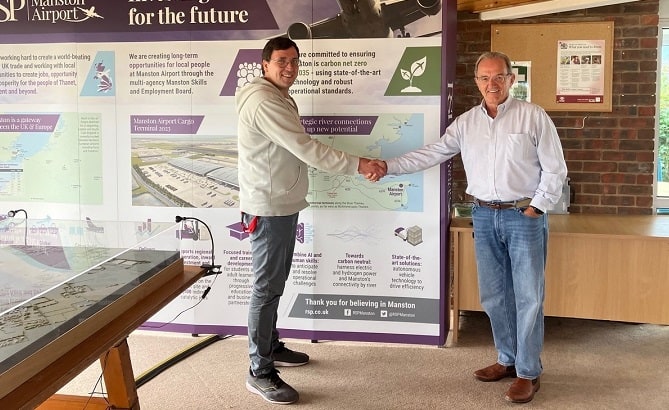
A Silicon Valley-based US business which opened a site in Discovery Park at Sandwich in February has agreed a partnership with Manston airport owners RiverOak Strategic Partners (RSP).
HyPoint is investing £11m in its team, research, development and production centre at Discovery Park as part of a commitment to advancing zero carbon-emission aviation. The company is developing turbo air-cooled hydrogen fuel cell systems for aviation and urban air mobility.
The NASA award-winning hydrogen fuel cell business is accelerating hydrogen innovation in the UK and, from its new facilities, HyPoint will apply its technology for a variety of aviation and urban air mobility uses, including for logistic drones, air taxis, electric vertical take-off and landing vehicles (eVTOLs), and fixed-wing airplanes.
The environmental potential offered by HyPoint was recognised by 10 Downing Street at the Green Investment Summit in October 2021.
The deal with RSP will enable HyPoint’s aviation customers to use the airport’s existing infrastructure and create new testing zones at Manston to evaluate HyPoint’s hydrogen fuel cell system in their new or retrofitted aircraft.
HyPoint and RSP say they have committed to exchange information about the development of hydrogen infrastructure in airports around the world; ongoing progress with respect to hydrogen fuel cell technology and usage; and various government and commercial initiatives related to hydrogen aviation.
The companies say they will also work together on related grant opportunities to implement the UK Net Zero Strategy and accelerate the transition to zero-emission aviation.
HyPoint founder and CEO Dr Alex Ivanenko said: “Along with HyPoint’s headquarters at Discovery Park in Sandwich, Kent is rapidly becoming the world’s go-to destination for hydrogen aviation innovation.
“This partnership will enable our customers to conduct real-world testing and evaluation of our hydrogen fuel cell systems in their aircraft — a critical step to bringing zero-emission hydrogen aviation to the world. In addition, our partnership will serve as a strategic pillar in the reopening of Manston Airport, which will be a boon for Kent and all of England.”
Tony Freudmann, of RSP, added: “Manston Airport has an illustrious history as a Battle of Britain airfield and, under our management, will have a promising future as a vibrant hub for international airfreight – one which delivers economic prosperity and employment across Kent and protects a strategic aviation resource for the nation.
“In addition to reopening Manston as a global freight hub, enabling the airport to fulfil its role in helping the UK trade across the globe and to import vital and time-sensitive goods, we plan to serve as an international hub for clean aviation development. We are excited to work alongside HyPoint and its customers to bring clean, safe, hydrogen-powered aircraft to market.”
Currently a new decision from government is awaited for a Development Consent Order for the Manston site.
The Development Consent Order granting approval in July 2020 for RSP’s air freight hub plan at Manston airport was quashed in February last year with a new decision now needing to be issued after a re-examination of the Planning Inspectorate evidence.
The action came as the result of a Judicial Review challenge to the decision, launched by Ramsgate resident Jenny Dawes. A substantive hearing was due to look at whether the Government followed correct procedure in reaching the decision to approve the DCO for airport landowners RiverOak Strategic Partners despite the Examining Authority conclusion against approval which followed a lengthy process of public hearings in 2019.
The Department of Transport acknowledged that the decision approval letter issued from the Minister of State did not contain enough detail about why approval was given against the advice of the Planning Inspectorate and said the Judicial Review would not be contested.
In June 2021 the then Secretary of State appointed an independent aviation assessor to advise him on matters relating to the need for the development and to draft a report summarising those findings.
The report published in October looked at various arguments for and against need of the airport and concluded there was no need. RSP disputed the validity of the report.
The DCO is still waiting to be redetermined.
Tony Freudmann says the airport would boost economic growth and jobs in Kent and the work with HyPoint will help put East Kent and the UK at the forefront of clean aviation.
Aviation produced 2.4 per cent of global CO2 emissions in 2018, which as a country would rank the UK 6th in the world between Japan and Germany and represents a greater share of global CO2 emissions than the 136 lowest-polluting countries combined. Non-CO2 effects, such as warming induced by aircraft contrails and other pollutants, bring aviation’s combined total contribution to global warming to approximately 5 per cent.
With fossil fuelled airplanes sold today expected to be in operation for decades — and air transportation is expected to continually increase — aviation’s contribution to climate change is expected to grow rapidly compared with other sectors that are already decarbonising.
HyPoint says by 2050, aviation will be responsible for 25% of global greenhouse gas emissions, up from just 10% today — unless we do something. They add: “We can not solve the existential climate crisis without zero-emission air transportation.”
The company utilises compressed air for both cooling and oxygen supply to deliver a hydrogen fuel cell system that outperforms existing battery and hydrogen fuel cell alternatives. By utilising specialised high-temperature membranes and an air-cooling system, HyPoint’s technology delivers performance while reducing total system weight by more than 60 per cent.
HyPoint is working with ZeroAvia which, in 2020, became the first company to successfully complete a hydrogen-electric passenger aircraft flight. It has raised $115 million from investors that include United Airlines, Alaska Airlines, Amazon’s Climate Pledge Fund, Breakthrough Energy Ventures (Bill Gates’ fund), Shell, and others.

